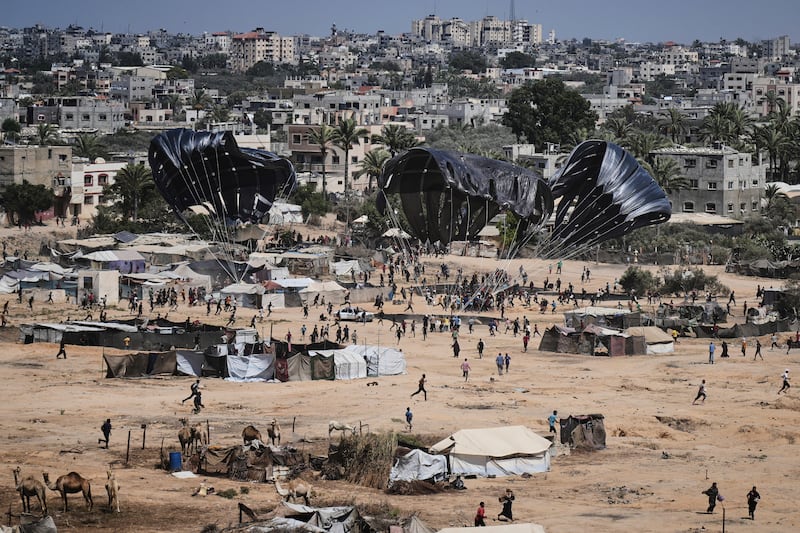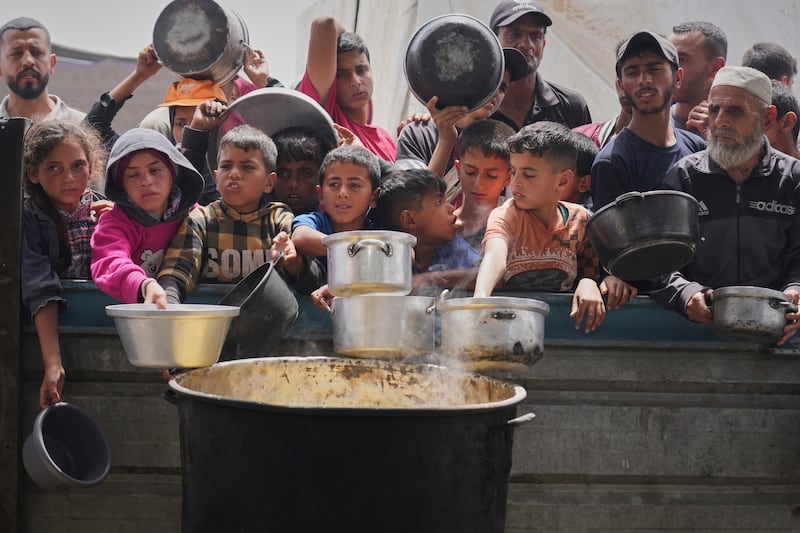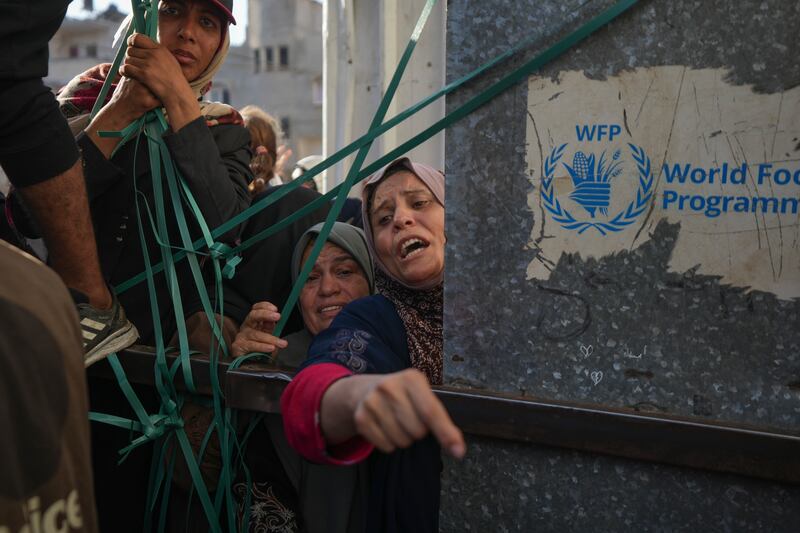At a bilateral meeting with British Prime Minister Keir Starmer at the Trump golf resort in Turnberry, Scotland, on Monday, President Donald Trump contradicted Israeli Prime Minister Benjamin Netanyahu’s claim that there was “no starvation” in the besieged Gaza Strip.
Responding to a flood of images showing the scale and severity of starvation in Gaza, the president dismissed claims that the hunger and starvation gripping Gaza were Hamas propaganda.
“Based on television, … those children look very hungry,” he said, referring to the disturbing images he had seen. “I see it, and you can’t fake that,” Trump said. “So we’re going to be even more involved.”
Later, Trump went further, adding: “Some of those kids are — that’s real starvation stuff.”

The president’s comments follow a joint statement issued last Friday by the United Kingdom, France and Germany after a call between French President Emmanuel Macron, British Prime Minister Keir Starmer and German Chancellor Friedrich Merz. The leaders called for an immediate ceasefire and an end to the humanitarian catastrophe in Gaza, stating that “withholding essential humanitarian assistance to the civilian population is unacceptable.”
Trump’s decision to address the serious humanitarian crisis in Gaza is both a moral and ethical obligation, and arguably a religious and legal duty. With over two million people affected — including thousands of infants, children, women, the elderly and the sick — Trump’s intervention is completely justifiable on moral and strategic grounds. It is neither pro-Hamas nor anti-Israel, and definitely not anti-American or anti-Semitic.
Indeed, Hamas’ leaders bear grave criminal responsibility for the suffering in Palestine. If Hamas truly cared about the Palestinian people, it would never have launched the October 7th attack on Israel, and it would have never killed Israeli civilians. Instead, it would have surrendered and released all the Israeli hostages, rather than exposing millions of Palestinians in Gaza and the West Bank to a deadly cycle of war, vengeance, famine, disease and despair.
To Hamas, with its ideology of victimhood and martyrdom, the children of Gaza are collateral damage in the larger struggle against occupation and colonialism. Hamas’ Operation al-Aqsa Flood, like al-Qaeda’s attacks on September 11th, and Khomeini’s hostage crisis in 1979, was aimed at triggering yet another clash of civilizations between the Islamic world and the West, with the strategic goal of shattering Pax Americana as a prelude to the destruction of Israel.
But Hamas’ embrace of death cannot justify or excuse the world’s failure to recognize and protect the sanctity of human life by following the laws of war that safeguard civilians, especially women and children.
The moral case for ending the war and allowing humanitarian aid into Gaza is compelling. If Trump were to allow a humanitarian crisis to escalate into what Israel’s former ministers and human rights groups describe as ethnic cleansing and condemn as genocide, the moral stain of letting women and children die of starvation would haunt all parties, nations and faiths for generations. None of our children would be spared, and all of our humanity would be compromised.

President Trump cannot follow in the footsteps of President Biden, whose U.S. Gaza pier, a $320 million public relations stunt in spring 2024, was a total failure — a naval corridor for delivering food to nowhere. What this moment calls for is decisive, coordinated global action — food delivered on the ground, with determination and dignity, not more delays, excuses or propaganda ploys. Given the irreversible damage caused by malnutrition, every calorie and convoy matters, and every hour is precious. We cannot afford to waste time.
The strategic case for action is also compelling. The United States must prevent Hamas from turning the humanitarian crisis in Gaza — the death of young children — into a symbol that shatters trust in our leadership and damages confidence in our values. The tragedy unfolding in Gaza should not become a wedge that divides generations at home, our alliances in Europe or our partnerships in the Middle East. Nor can we let our global and regional interests in peace and prosperity be held hostage to tribalism and factionalism, especially the apocalyptic fantasies of religious extremists. The Iranian regime, Russia and China all seek to weaponize the Palestinian cause to demonize the United States in the Islamic world. The reality is that the crisis in Gaza could ignite yet another catastrophic war in the Middle East if the United States is perceived to be rigging the game to prolong rather than end the war in Gaza.
Rather than let the Gaza war tarnish his presidency like the Taliban damaged Biden or Khomeini damaged the Carter presidency, Trump should learn from President Dwight D. Eisenhower. During the Suez crisis — the invasion of Egypt’s Sinai Peninsula on October 29, 1956, by France and Britain, claiming to protect the canal — Eisenhower forced Britain and France to accept a ceasefire by November 6. He publicly criticized two of our closest allies and prevented a potentially disastrous war with Egypt and the Arab world in less than a week.
President Trump faces a less severe challenge — Gaza is not Egypt. He doesn’t need anyone’s permission to act in the best interest of the American people. Instead of surrendering to our enemies or yielding to our allies on issues that affect our moral integrity and national interests, Trump can demand a resolution to this crisis, specify the actions needed from all parties and determine the outcome — the delivery of food to Gaza’s children. Their starvation is real, not fake. The time to end their crisis has arrived. Let us honor their lives so that Hamas cannot count on their deaths.


